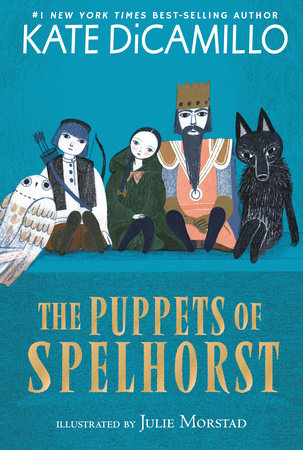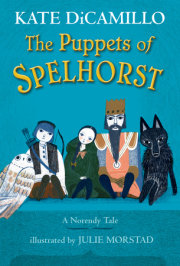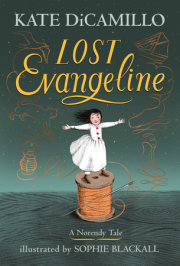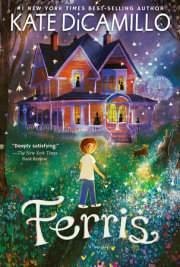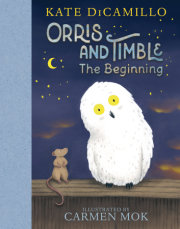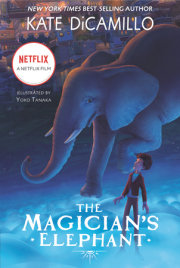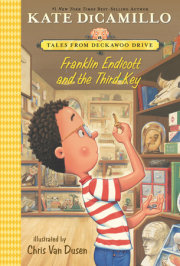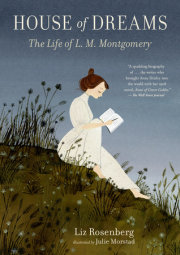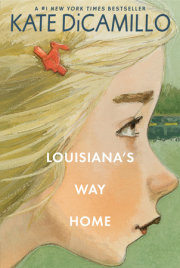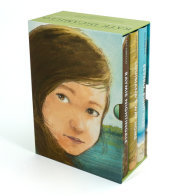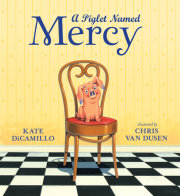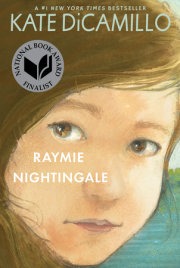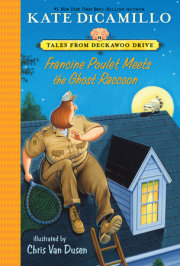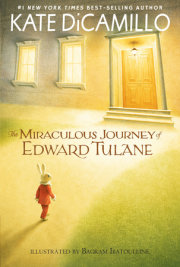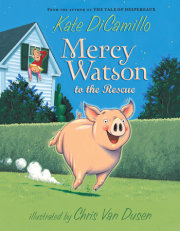


A New York Times bestseller!
“Guaranteed to enchant young readers. This collaboration by two masters of their craft—a Newbery Medalist and a Governor General’s Literary Award finalist—will prove irresistible.” —Booklist (starred review)
Shut up in a trunk by a taciturn old sea captain with a secret, five friends—a king, a wolf, a girl, a boy, and an owl—bicker, boast, and comfort one another in the dark. Individually, they dream of song and light, freedom and flight, purpose and glory, but they all agree they are part of a larger story, bound each to each by chance, bonded by the heart’s mysteries. When at last their shared fate arrives, landing them on a mantel in a blue room in the home of two little girls, the truth is more astonishing than any of them could have imagined. A beloved author of modern classics draws on her most moving themes with humor, heart, and wisdom in the first of the Norendy Tales, a projected trio of novellas linked by place and mood, each illustrated in black and white by a different virtuoso illustrator. This first tale is one that promises to soothe and strengthen us on our journey, leading us through whatever dark forest we find ourselves in.
“Guaranteed to enchant young readers. This collaboration by two masters of their craft—a Newbery Medalist and a Governor General’s Literary Award finalist—will prove irresistible.” —Booklist (starred review)
Shut up in a trunk by a taciturn old sea captain with a secret, five friends—a king, a wolf, a girl, a boy, and an owl—bicker, boast, and comfort one another in the dark. Individually, they dream of song and light, freedom and flight, purpose and glory, but they all agree they are part of a larger story, bound each to each by chance, bonded by the heart’s mysteries. When at last their shared fate arrives, landing them on a mantel in a blue room in the home of two little girls, the truth is more astonishing than any of them could have imagined. A beloved author of modern classics draws on her most moving themes with humor, heart, and wisdom in the first of the Norendy Tales, a projected trio of novellas linked by place and mood, each illustrated in black and white by a different virtuoso illustrator. This first tale is one that promises to soothe and strengthen us on our journey, leading us through whatever dark forest we find ourselves in.
-
WINNER
| 2024
Children's Book Council - Children’s & Teen Choice Book Awards -
NOMINEE
| 2024
ALSC Notable Children's Books -
SELECTION
| 2024
Bank Street College Best Children's Book of the Year -
FINALIST
| 2024
Minnesota Book Award -
SELECTION
| 2023
Chicago Public Library's Best of the Best Books -
SELECTION
| 2023
Junior Library Guild Selection -
FINALIST
| 2023
Barnes & Noble Best Book of the Year
Five puppets pass through the lives of one sad adult after another, hoping to find their story. Their journey is illustrated in entrancing, haunted black-and-white art by Julie Morstad. Finally, the puppets are given to a child who writes a play for them to star in — a play that ties the tales of all the forlorn adults back together in a tour de force that a lesser author would be afraid even to attempt. . . Both ‘Despereaux’ and ‘Spelhorst’ demand a lot of their readers. . . Children need stories that help them explore . . . darkness.”
—The New York Times Book Review
A quintet of puppets—“the king and the wolf and the girl/ and the boy and the owl”—ponder their dreams and yearnings in this quietly entrancing novella told in three acts. . . . Newbery Medalist DiCamillo applies spare prose and witty conversation in fleshing out the puppets’ desires as well as exploring the power of stories to promote community and offer a path to fulfillment.
—Publishers Weekly (starred review)
Like many other stories featuring toys, from Hitty to The Mouse and His Child, there is a strain of melancholy here, with characters who long for autonomy but whose existence is dependent on the imaginations of others. This mood is perfectly captured in digitally rendered pencil drawings that add specificity (a Regency-esque setting in fictional Norendy), dignity, drama, and sheer beauty.
—The Horn Book (starred review
What treasure box does DiCamillo have in store for young readers this time? One that contains five beautifully crafted puppets. . . DiCamillo’s storytelling is as effortless as always, and Morstad’s frequent pencil illustrations elevate it further. This first of the Norendy Tales chapter-book series is guaranteed to enchant young readers. This collaboration by two masters of their craft—a Newbery Medalist and a Governor General’s Literary Award finalist—will prove irresistible.
—Booklist (starred review)
The illustrations bring the puppets to life and add to the magic and whimsy of the tale. With themes of love and loss, this chapter book reminds us there is light to be found in every darkness. . . An enchanting and original fairy tale that will delight both young and old.
—School Library Journal (starred review)
A new book from Kate DiCamillo always gives reason to celebrate, and her latest fairy tale is no exception. . . . The Puppets of Spelhorst’s short chapters of simple yet often profound prose beg to be read aloud. This exciting, fast-paced story contains several pointed touches of female empowerment as well as a glorious surprise ending that is revealed in a full-page spread. Julie Morstad’s illustrations do an excellent job of setting an old-fashioned, fairy-tale mood while achieving a delicate feat: making these puppets look both inanimate yet lively. . . With all the makings of a classic fairy tale, The Puppets of Spelhorst skillfully addresses many of DiCamillo’s favorite themes: the power of love and togetherness; the many unexpected wonders of the world; the importance of following one’s dreams; and the majesty of stories and storytelling.
—BookPage (starred review)
The first of an anticipated trilogy of novellas, this is a quiet story of belonging, family, and destiny. The illustrations do remarkable work in reflecting the blank eyes and fixed features of the puppets while also evoking a strong emotional response to them through subtle choices in their posture, shading, and relative size on the page.
—The Bulletin of the Center for Children's Books
DiCamillo has a knack for capturing the real sentiments of children (and puppets), foibles and all, in fantastical settings and circumstances. . . . As in all DiCamillo's stories, the pages are peppered with smart, wry humor, balanced with moving moments of flawed humanity. An absolute gem. . . . Kate DiCamillo's dazzling first title in the Norendy Tales trilogy is brimming with wit, whimsy, and heart as it follows five puppets fulfilling their thrilling shared destiny.
—Shelf Awareness
Puppets yearn for greater things. . . . A quiet, comforting fable of identity and belonging.
—Kirkus Reviews
Ms. DiCamillo is always a careful writer, deploying words with dignity, economy and affection. . . readers ages 7-10 are likely to want to know what happens next.
—The Wall Street Journal
Lyrically written and enchantingly illustrated, it's an instant classic created by two masters in their craft.
—The San Francisco Chronicle
An unforgettable fairy tale about five puppets seeking to pursue their dreams. With enchanting illustrations from Julie Morstad, The Puppets of Spelhorst is a magical story perfect for family read-alouds.
—The Barnes & Noble Reads Blog
Wow. DiCamillo’s The Puppets of Spelhorst is a master class in storytelling. As soon as I finished the book, I turned back to page one and started reading it again. Five stars.
—Colby Sharp, educator and coauthor of The Commonsense Guide to Your Classroom Library
There’s so much more to talk about with this book. The role of the girls who play with the puppets and how their very different impressions of them cause great changes. The role of the maid Jane Twiddum and what she wants. Heck, there’s a whole undercurrent of feminism and the roles puppets and living women play within society, but I suppose I’ll save that for someone else’s thesis. The important thing to understand is that this is a story where it doesn’t matter how physically passive you are. Your interior life, your hopes and dreams and goals, that’s the thing that matters. That’s what’s going to make you into an active protagonist in the end, regardless of whether or not you have the ability to move. The Puppets of Spelhorst taught me that. Now imagine what it could teach your own children.
—Betsy Bird, A Fuse #8 Production, School Library Journal
—The New York Times Book Review
A quintet of puppets—“the king and the wolf and the girl/ and the boy and the owl”—ponder their dreams and yearnings in this quietly entrancing novella told in three acts. . . . Newbery Medalist DiCamillo applies spare prose and witty conversation in fleshing out the puppets’ desires as well as exploring the power of stories to promote community and offer a path to fulfillment.
—Publishers Weekly (starred review)
Like many other stories featuring toys, from Hitty to The Mouse and His Child, there is a strain of melancholy here, with characters who long for autonomy but whose existence is dependent on the imaginations of others. This mood is perfectly captured in digitally rendered pencil drawings that add specificity (a Regency-esque setting in fictional Norendy), dignity, drama, and sheer beauty.
—The Horn Book (starred review
What treasure box does DiCamillo have in store for young readers this time? One that contains five beautifully crafted puppets. . . DiCamillo’s storytelling is as effortless as always, and Morstad’s frequent pencil illustrations elevate it further. This first of the Norendy Tales chapter-book series is guaranteed to enchant young readers. This collaboration by two masters of their craft—a Newbery Medalist and a Governor General’s Literary Award finalist—will prove irresistible.
—Booklist (starred review)
The illustrations bring the puppets to life and add to the magic and whimsy of the tale. With themes of love and loss, this chapter book reminds us there is light to be found in every darkness. . . An enchanting and original fairy tale that will delight both young and old.
—School Library Journal (starred review)
A new book from Kate DiCamillo always gives reason to celebrate, and her latest fairy tale is no exception. . . . The Puppets of Spelhorst’s short chapters of simple yet often profound prose beg to be read aloud. This exciting, fast-paced story contains several pointed touches of female empowerment as well as a glorious surprise ending that is revealed in a full-page spread. Julie Morstad’s illustrations do an excellent job of setting an old-fashioned, fairy-tale mood while achieving a delicate feat: making these puppets look both inanimate yet lively. . . With all the makings of a classic fairy tale, The Puppets of Spelhorst skillfully addresses many of DiCamillo’s favorite themes: the power of love and togetherness; the many unexpected wonders of the world; the importance of following one’s dreams; and the majesty of stories and storytelling.
—BookPage (starred review)
The first of an anticipated trilogy of novellas, this is a quiet story of belonging, family, and destiny. The illustrations do remarkable work in reflecting the blank eyes and fixed features of the puppets while also evoking a strong emotional response to them through subtle choices in their posture, shading, and relative size on the page.
—The Bulletin of the Center for Children's Books
DiCamillo has a knack for capturing the real sentiments of children (and puppets), foibles and all, in fantastical settings and circumstances. . . . As in all DiCamillo's stories, the pages are peppered with smart, wry humor, balanced with moving moments of flawed humanity. An absolute gem. . . . Kate DiCamillo's dazzling first title in the Norendy Tales trilogy is brimming with wit, whimsy, and heart as it follows five puppets fulfilling their thrilling shared destiny.
—Shelf Awareness
Puppets yearn for greater things. . . . A quiet, comforting fable of identity and belonging.
—Kirkus Reviews
Ms. DiCamillo is always a careful writer, deploying words with dignity, economy and affection. . . readers ages 7-10 are likely to want to know what happens next.
—The Wall Street Journal
Lyrically written and enchantingly illustrated, it's an instant classic created by two masters in their craft.
—The San Francisco Chronicle
An unforgettable fairy tale about five puppets seeking to pursue their dreams. With enchanting illustrations from Julie Morstad, The Puppets of Spelhorst is a magical story perfect for family read-alouds.
—The Barnes & Noble Reads Blog
Wow. DiCamillo’s The Puppets of Spelhorst is a master class in storytelling. As soon as I finished the book, I turned back to page one and started reading it again. Five stars.
—Colby Sharp, educator and coauthor of The Commonsense Guide to Your Classroom Library
There’s so much more to talk about with this book. The role of the girls who play with the puppets and how their very different impressions of them cause great changes. The role of the maid Jane Twiddum and what she wants. Heck, there’s a whole undercurrent of feminism and the roles puppets and living women play within society, but I suppose I’ll save that for someone else’s thesis. The important thing to understand is that this is a story where it doesn’t matter how physically passive you are. Your interior life, your hopes and dreams and goals, that’s the thing that matters. That’s what’s going to make you into an active protagonist in the end, regardless of whether or not you have the ability to move. The Puppets of Spelhorst taught me that. Now imagine what it could teach your own children.
—Betsy Bird, A Fuse #8 Production, School Library Journal
Chapter One
There was once an old sea captain who lived in a small room above a tailor shop. The captain’s name was Spelhorst, and he had no wife, no children, no family. He was alone in the world and took his meals at a café down the street from the tailor shop. There, the old man would sit at a table and stare past everything and everyone as if he were on the prow of a ship, looking out to sea.
One of the captain’s eyes was clouded over with cataracts, but the other eye was a bright and astonishing blue.
On good days, days when his knees did not ache and the weather was fine, Spelhorst walked around the city for hours at a time.
On bad days, he stayed abed, staring at the ceiling, studying its cracks and water stains and spiderwebs. He listened to the door of the tailor shop as it opened and closed. He could hear the murmur of voices, the sound of people requesting things, demanding things. Sometimes he could hear the tailor shouting at his wife in Italian. Sometimes he could hear the tailor’s wife weeping.
The pigeons on the windowsill of Spelhorst’s room looked in at the old man with bright, disdainful eyes. The birds arrived and departed and returned, and their wings sounded like someone shuffling a deck of cards.
The sea captain paid the pigeons no mind.
He did not even look in their direction.
He kept his eyes on the ceiling.
He tried to think of nothing at all.
**
And then there came a day—a good day—when Spelhorst’s knees did not ache and the weather was clear, and the old man walked and walked. He ended up very far from the tailor shop, in a part of the city that he did not know, in an alley that was dark and winding.
He came upon a toy shop, and in the window of the shop, he saw displayed a king and a wolf and a girl and a boy and an owl.
The puppets were hanging from fishing line. They were turning slowly in the gust of air made by the opening and closing of the shop door.
Spelhorst stopped. He took his cap from his head and stared at the puppets.
There he was: a man without family, a man without children or grandchildren, a man utterly devoid of whimsy or wonder, staring at a toy store window, bewitched entirely by puppets.
But Spelhorst was not staring at all of the puppets. He was staring at one puppet only—the girl with the cloak and the shepherd’s crook.
The girl had the heart-shaped face and violet eyes of someone Spelhorst had loved long ago.
Loved and lost.
Loved and lost, loved and lost, the ever-repeating story of the world.
“I must have her,” Spelhorst said aloud to no one.
He put his hat on his head, went into the store, and announced to the clerk that he wished to purchase one of the puppets on display in the window.
“You cannot buy just one,” said the clerk. “They belong together.”
“I want the girl puppet only,” said Spelhorst.
“The puppets must be purchased together or not at all,” said the clerk, “for they are in
a story.”
Spelhorst stared at the clerk.
Story? What did a story matter to him?
The door to the shop opened and closed. The puppets danced in the small wind, and the girl puppet twisted about suddenly so that she was facing the captain, looking at him.
Spelhorst closed his eyes and then opened them again. He said, “Very well. All of them.”
He took the puppets with him back to the room above the tailor shop.
He threw the king and the wolf and the owl and the boy into the trunk at the foot of his bed.
But the girl puppet Spelhorst propped up on the table so that he might look into her violet eyes.
He sat on the bed and stared at her. He said, “I am sorry. I am sorry, Annalise. I am sorry.” He put his head in his hands, and then he got up from the bed and sat down at the table and took up a pen and paper. He wrote for a long time.
When he was done, he folded the paper and put it in the trunk, and then the old man sat at the table and wept.
Outside the room, perched on the windowsill, the pigeons looked in at the sea captain and made noises of despair and disapproval.
It grew dark.
Spelhorst did not light the lamp.
He got into bed and cried himself to sleep as if he were a small child.
There was once an old sea captain who lived in a small room above a tailor shop. The captain’s name was Spelhorst, and he had no wife, no children, no family. He was alone in the world and took his meals at a café down the street from the tailor shop. There, the old man would sit at a table and stare past everything and everyone as if he were on the prow of a ship, looking out to sea.
One of the captain’s eyes was clouded over with cataracts, but the other eye was a bright and astonishing blue.
On good days, days when his knees did not ache and the weather was fine, Spelhorst walked around the city for hours at a time.
On bad days, he stayed abed, staring at the ceiling, studying its cracks and water stains and spiderwebs. He listened to the door of the tailor shop as it opened and closed. He could hear the murmur of voices, the sound of people requesting things, demanding things. Sometimes he could hear the tailor shouting at his wife in Italian. Sometimes he could hear the tailor’s wife weeping.
The pigeons on the windowsill of Spelhorst’s room looked in at the old man with bright, disdainful eyes. The birds arrived and departed and returned, and their wings sounded like someone shuffling a deck of cards.
The sea captain paid the pigeons no mind.
He did not even look in their direction.
He kept his eyes on the ceiling.
He tried to think of nothing at all.
**
And then there came a day—a good day—when Spelhorst’s knees did not ache and the weather was clear, and the old man walked and walked. He ended up very far from the tailor shop, in a part of the city that he did not know, in an alley that was dark and winding.
He came upon a toy shop, and in the window of the shop, he saw displayed a king and a wolf and a girl and a boy and an owl.
The puppets were hanging from fishing line. They were turning slowly in the gust of air made by the opening and closing of the shop door.
Spelhorst stopped. He took his cap from his head and stared at the puppets.
There he was: a man without family, a man without children or grandchildren, a man utterly devoid of whimsy or wonder, staring at a toy store window, bewitched entirely by puppets.
But Spelhorst was not staring at all of the puppets. He was staring at one puppet only—the girl with the cloak and the shepherd’s crook.
The girl had the heart-shaped face and violet eyes of someone Spelhorst had loved long ago.
Loved and lost.
Loved and lost, loved and lost, the ever-repeating story of the world.
“I must have her,” Spelhorst said aloud to no one.
He put his hat on his head, went into the store, and announced to the clerk that he wished to purchase one of the puppets on display in the window.
“You cannot buy just one,” said the clerk. “They belong together.”
“I want the girl puppet only,” said Spelhorst.
“The puppets must be purchased together or not at all,” said the clerk, “for they are in
a story.”
Spelhorst stared at the clerk.
Story? What did a story matter to him?
The door to the shop opened and closed. The puppets danced in the small wind, and the girl puppet twisted about suddenly so that she was facing the captain, looking at him.
Spelhorst closed his eyes and then opened them again. He said, “Very well. All of them.”
He took the puppets with him back to the room above the tailor shop.
He threw the king and the wolf and the owl and the boy into the trunk at the foot of his bed.
But the girl puppet Spelhorst propped up on the table so that he might look into her violet eyes.
He sat on the bed and stared at her. He said, “I am sorry. I am sorry, Annalise. I am sorry.” He put his head in his hands, and then he got up from the bed and sat down at the table and took up a pen and paper. He wrote for a long time.
When he was done, he folded the paper and put it in the trunk, and then the old man sat at the table and wept.
Outside the room, perched on the windowsill, the pigeons looked in at the sea captain and made noises of despair and disapproval.
It grew dark.
Spelhorst did not light the lamp.
He got into bed and cried himself to sleep as if he were a small child.
Copyright © 2023 by Kate DiCamillo; Illustrated by Julie Morstad. All rights reserved. No part of this excerpt may be reproduced or reprinted without permission in writing from the publisher.
Photos



About
A New York Times bestseller!
“Guaranteed to enchant young readers. This collaboration by two masters of their craft—a Newbery Medalist and a Governor General’s Literary Award finalist—will prove irresistible.” —Booklist (starred review)
Shut up in a trunk by a taciturn old sea captain with a secret, five friends—a king, a wolf, a girl, a boy, and an owl—bicker, boast, and comfort one another in the dark. Individually, they dream of song and light, freedom and flight, purpose and glory, but they all agree they are part of a larger story, bound each to each by chance, bonded by the heart’s mysteries. When at last their shared fate arrives, landing them on a mantel in a blue room in the home of two little girls, the truth is more astonishing than any of them could have imagined. A beloved author of modern classics draws on her most moving themes with humor, heart, and wisdom in the first of the Norendy Tales, a projected trio of novellas linked by place and mood, each illustrated in black and white by a different virtuoso illustrator. This first tale is one that promises to soothe and strengthen us on our journey, leading us through whatever dark forest we find ourselves in.
“Guaranteed to enchant young readers. This collaboration by two masters of their craft—a Newbery Medalist and a Governor General’s Literary Award finalist—will prove irresistible.” —Booklist (starred review)
Shut up in a trunk by a taciturn old sea captain with a secret, five friends—a king, a wolf, a girl, a boy, and an owl—bicker, boast, and comfort one another in the dark. Individually, they dream of song and light, freedom and flight, purpose and glory, but they all agree they are part of a larger story, bound each to each by chance, bonded by the heart’s mysteries. When at last their shared fate arrives, landing them on a mantel in a blue room in the home of two little girls, the truth is more astonishing than any of them could have imagined. A beloved author of modern classics draws on her most moving themes with humor, heart, and wisdom in the first of the Norendy Tales, a projected trio of novellas linked by place and mood, each illustrated in black and white by a different virtuoso illustrator. This first tale is one that promises to soothe and strengthen us on our journey, leading us through whatever dark forest we find ourselves in.
Awards
-
WINNER
| 2024
Children's Book Council - Children’s & Teen Choice Book Awards -
NOMINEE
| 2024
ALSC Notable Children's Books -
SELECTION
| 2024
Bank Street College Best Children's Book of the Year -
FINALIST
| 2024
Minnesota Book Award -
SELECTION
| 2023
Chicago Public Library's Best of the Best Books -
SELECTION
| 2023
Junior Library Guild Selection -
FINALIST
| 2023
Barnes & Noble Best Book of the Year
Praise
Five puppets pass through the lives of one sad adult after another, hoping to find their story. Their journey is illustrated in entrancing, haunted black-and-white art by Julie Morstad. Finally, the puppets are given to a child who writes a play for them to star in — a play that ties the tales of all the forlorn adults back together in a tour de force that a lesser author would be afraid even to attempt. . . Both ‘Despereaux’ and ‘Spelhorst’ demand a lot of their readers. . . Children need stories that help them explore . . . darkness.”
—The New York Times Book Review
A quintet of puppets—“the king and the wolf and the girl/ and the boy and the owl”—ponder their dreams and yearnings in this quietly entrancing novella told in three acts. . . . Newbery Medalist DiCamillo applies spare prose and witty conversation in fleshing out the puppets’ desires as well as exploring the power of stories to promote community and offer a path to fulfillment.
—Publishers Weekly (starred review)
Like many other stories featuring toys, from Hitty to The Mouse and His Child, there is a strain of melancholy here, with characters who long for autonomy but whose existence is dependent on the imaginations of others. This mood is perfectly captured in digitally rendered pencil drawings that add specificity (a Regency-esque setting in fictional Norendy), dignity, drama, and sheer beauty.
—The Horn Book (starred review
What treasure box does DiCamillo have in store for young readers this time? One that contains five beautifully crafted puppets. . . DiCamillo’s storytelling is as effortless as always, and Morstad’s frequent pencil illustrations elevate it further. This first of the Norendy Tales chapter-book series is guaranteed to enchant young readers. This collaboration by two masters of their craft—a Newbery Medalist and a Governor General’s Literary Award finalist—will prove irresistible.
—Booklist (starred review)
The illustrations bring the puppets to life and add to the magic and whimsy of the tale. With themes of love and loss, this chapter book reminds us there is light to be found in every darkness. . . An enchanting and original fairy tale that will delight both young and old.
—School Library Journal (starred review)
A new book from Kate DiCamillo always gives reason to celebrate, and her latest fairy tale is no exception. . . . The Puppets of Spelhorst’s short chapters of simple yet often profound prose beg to be read aloud. This exciting, fast-paced story contains several pointed touches of female empowerment as well as a glorious surprise ending that is revealed in a full-page spread. Julie Morstad’s illustrations do an excellent job of setting an old-fashioned, fairy-tale mood while achieving a delicate feat: making these puppets look both inanimate yet lively. . . With all the makings of a classic fairy tale, The Puppets of Spelhorst skillfully addresses many of DiCamillo’s favorite themes: the power of love and togetherness; the many unexpected wonders of the world; the importance of following one’s dreams; and the majesty of stories and storytelling.
—BookPage (starred review)
The first of an anticipated trilogy of novellas, this is a quiet story of belonging, family, and destiny. The illustrations do remarkable work in reflecting the blank eyes and fixed features of the puppets while also evoking a strong emotional response to them through subtle choices in their posture, shading, and relative size on the page.
—The Bulletin of the Center for Children's Books
DiCamillo has a knack for capturing the real sentiments of children (and puppets), foibles and all, in fantastical settings and circumstances. . . . As in all DiCamillo's stories, the pages are peppered with smart, wry humor, balanced with moving moments of flawed humanity. An absolute gem. . . . Kate DiCamillo's dazzling first title in the Norendy Tales trilogy is brimming with wit, whimsy, and heart as it follows five puppets fulfilling their thrilling shared destiny.
—Shelf Awareness
Puppets yearn for greater things. . . . A quiet, comforting fable of identity and belonging.
—Kirkus Reviews
Ms. DiCamillo is always a careful writer, deploying words with dignity, economy and affection. . . readers ages 7-10 are likely to want to know what happens next.
—The Wall Street Journal
Lyrically written and enchantingly illustrated, it's an instant classic created by two masters in their craft.
—The San Francisco Chronicle
An unforgettable fairy tale about five puppets seeking to pursue their dreams. With enchanting illustrations from Julie Morstad, The Puppets of Spelhorst is a magical story perfect for family read-alouds.
—The Barnes & Noble Reads Blog
Wow. DiCamillo’s The Puppets of Spelhorst is a master class in storytelling. As soon as I finished the book, I turned back to page one and started reading it again. Five stars.
—Colby Sharp, educator and coauthor of The Commonsense Guide to Your Classroom Library
There’s so much more to talk about with this book. The role of the girls who play with the puppets and how their very different impressions of them cause great changes. The role of the maid Jane Twiddum and what she wants. Heck, there’s a whole undercurrent of feminism and the roles puppets and living women play within society, but I suppose I’ll save that for someone else’s thesis. The important thing to understand is that this is a story where it doesn’t matter how physically passive you are. Your interior life, your hopes and dreams and goals, that’s the thing that matters. That’s what’s going to make you into an active protagonist in the end, regardless of whether or not you have the ability to move. The Puppets of Spelhorst taught me that. Now imagine what it could teach your own children.
—Betsy Bird, A Fuse #8 Production, School Library Journal
—The New York Times Book Review
A quintet of puppets—“the king and the wolf and the girl/ and the boy and the owl”—ponder their dreams and yearnings in this quietly entrancing novella told in three acts. . . . Newbery Medalist DiCamillo applies spare prose and witty conversation in fleshing out the puppets’ desires as well as exploring the power of stories to promote community and offer a path to fulfillment.
—Publishers Weekly (starred review)
Like many other stories featuring toys, from Hitty to The Mouse and His Child, there is a strain of melancholy here, with characters who long for autonomy but whose existence is dependent on the imaginations of others. This mood is perfectly captured in digitally rendered pencil drawings that add specificity (a Regency-esque setting in fictional Norendy), dignity, drama, and sheer beauty.
—The Horn Book (starred review
What treasure box does DiCamillo have in store for young readers this time? One that contains five beautifully crafted puppets. . . DiCamillo’s storytelling is as effortless as always, and Morstad’s frequent pencil illustrations elevate it further. This first of the Norendy Tales chapter-book series is guaranteed to enchant young readers. This collaboration by two masters of their craft—a Newbery Medalist and a Governor General’s Literary Award finalist—will prove irresistible.
—Booklist (starred review)
The illustrations bring the puppets to life and add to the magic and whimsy of the tale. With themes of love and loss, this chapter book reminds us there is light to be found in every darkness. . . An enchanting and original fairy tale that will delight both young and old.
—School Library Journal (starred review)
A new book from Kate DiCamillo always gives reason to celebrate, and her latest fairy tale is no exception. . . . The Puppets of Spelhorst’s short chapters of simple yet often profound prose beg to be read aloud. This exciting, fast-paced story contains several pointed touches of female empowerment as well as a glorious surprise ending that is revealed in a full-page spread. Julie Morstad’s illustrations do an excellent job of setting an old-fashioned, fairy-tale mood while achieving a delicate feat: making these puppets look both inanimate yet lively. . . With all the makings of a classic fairy tale, The Puppets of Spelhorst skillfully addresses many of DiCamillo’s favorite themes: the power of love and togetherness; the many unexpected wonders of the world; the importance of following one’s dreams; and the majesty of stories and storytelling.
—BookPage (starred review)
The first of an anticipated trilogy of novellas, this is a quiet story of belonging, family, and destiny. The illustrations do remarkable work in reflecting the blank eyes and fixed features of the puppets while also evoking a strong emotional response to them through subtle choices in their posture, shading, and relative size on the page.
—The Bulletin of the Center for Children's Books
DiCamillo has a knack for capturing the real sentiments of children (and puppets), foibles and all, in fantastical settings and circumstances. . . . As in all DiCamillo's stories, the pages are peppered with smart, wry humor, balanced with moving moments of flawed humanity. An absolute gem. . . . Kate DiCamillo's dazzling first title in the Norendy Tales trilogy is brimming with wit, whimsy, and heart as it follows five puppets fulfilling their thrilling shared destiny.
—Shelf Awareness
Puppets yearn for greater things. . . . A quiet, comforting fable of identity and belonging.
—Kirkus Reviews
Ms. DiCamillo is always a careful writer, deploying words with dignity, economy and affection. . . readers ages 7-10 are likely to want to know what happens next.
—The Wall Street Journal
Lyrically written and enchantingly illustrated, it's an instant classic created by two masters in their craft.
—The San Francisco Chronicle
An unforgettable fairy tale about five puppets seeking to pursue their dreams. With enchanting illustrations from Julie Morstad, The Puppets of Spelhorst is a magical story perfect for family read-alouds.
—The Barnes & Noble Reads Blog
Wow. DiCamillo’s The Puppets of Spelhorst is a master class in storytelling. As soon as I finished the book, I turned back to page one and started reading it again. Five stars.
—Colby Sharp, educator and coauthor of The Commonsense Guide to Your Classroom Library
There’s so much more to talk about with this book. The role of the girls who play with the puppets and how their very different impressions of them cause great changes. The role of the maid Jane Twiddum and what she wants. Heck, there’s a whole undercurrent of feminism and the roles puppets and living women play within society, but I suppose I’ll save that for someone else’s thesis. The important thing to understand is that this is a story where it doesn’t matter how physically passive you are. Your interior life, your hopes and dreams and goals, that’s the thing that matters. That’s what’s going to make you into an active protagonist in the end, regardless of whether or not you have the ability to move. The Puppets of Spelhorst taught me that. Now imagine what it could teach your own children.
—Betsy Bird, A Fuse #8 Production, School Library Journal
Author
Excerpt
Chapter One
There was once an old sea captain who lived in a small room above a tailor shop. The captain’s name was Spelhorst, and he had no wife, no children, no family. He was alone in the world and took his meals at a café down the street from the tailor shop. There, the old man would sit at a table and stare past everything and everyone as if he were on the prow of a ship, looking out to sea.
One of the captain’s eyes was clouded over with cataracts, but the other eye was a bright and astonishing blue.
On good days, days when his knees did not ache and the weather was fine, Spelhorst walked around the city for hours at a time.
On bad days, he stayed abed, staring at the ceiling, studying its cracks and water stains and spiderwebs. He listened to the door of the tailor shop as it opened and closed. He could hear the murmur of voices, the sound of people requesting things, demanding things. Sometimes he could hear the tailor shouting at his wife in Italian. Sometimes he could hear the tailor’s wife weeping.
The pigeons on the windowsill of Spelhorst’s room looked in at the old man with bright, disdainful eyes. The birds arrived and departed and returned, and their wings sounded like someone shuffling a deck of cards.
The sea captain paid the pigeons no mind.
He did not even look in their direction.
He kept his eyes on the ceiling.
He tried to think of nothing at all.
**
And then there came a day—a good day—when Spelhorst’s knees did not ache and the weather was clear, and the old man walked and walked. He ended up very far from the tailor shop, in a part of the city that he did not know, in an alley that was dark and winding.
He came upon a toy shop, and in the window of the shop, he saw displayed a king and a wolf and a girl and a boy and an owl.
The puppets were hanging from fishing line. They were turning slowly in the gust of air made by the opening and closing of the shop door.
Spelhorst stopped. He took his cap from his head and stared at the puppets.
There he was: a man without family, a man without children or grandchildren, a man utterly devoid of whimsy or wonder, staring at a toy store window, bewitched entirely by puppets.
But Spelhorst was not staring at all of the puppets. He was staring at one puppet only—the girl with the cloak and the shepherd’s crook.
The girl had the heart-shaped face and violet eyes of someone Spelhorst had loved long ago.
Loved and lost.
Loved and lost, loved and lost, the ever-repeating story of the world.
“I must have her,” Spelhorst said aloud to no one.
He put his hat on his head, went into the store, and announced to the clerk that he wished to purchase one of the puppets on display in the window.
“You cannot buy just one,” said the clerk. “They belong together.”
“I want the girl puppet only,” said Spelhorst.
“The puppets must be purchased together or not at all,” said the clerk, “for they are in
a story.”
Spelhorst stared at the clerk.
Story? What did a story matter to him?
The door to the shop opened and closed. The puppets danced in the small wind, and the girl puppet twisted about suddenly so that she was facing the captain, looking at him.
Spelhorst closed his eyes and then opened them again. He said, “Very well. All of them.”
He took the puppets with him back to the room above the tailor shop.
He threw the king and the wolf and the owl and the boy into the trunk at the foot of his bed.
But the girl puppet Spelhorst propped up on the table so that he might look into her violet eyes.
He sat on the bed and stared at her. He said, “I am sorry. I am sorry, Annalise. I am sorry.” He put his head in his hands, and then he got up from the bed and sat down at the table and took up a pen and paper. He wrote for a long time.
When he was done, he folded the paper and put it in the trunk, and then the old man sat at the table and wept.
Outside the room, perched on the windowsill, the pigeons looked in at the sea captain and made noises of despair and disapproval.
It grew dark.
Spelhorst did not light the lamp.
He got into bed and cried himself to sleep as if he were a small child.
There was once an old sea captain who lived in a small room above a tailor shop. The captain’s name was Spelhorst, and he had no wife, no children, no family. He was alone in the world and took his meals at a café down the street from the tailor shop. There, the old man would sit at a table and stare past everything and everyone as if he were on the prow of a ship, looking out to sea.
One of the captain’s eyes was clouded over with cataracts, but the other eye was a bright and astonishing blue.
On good days, days when his knees did not ache and the weather was fine, Spelhorst walked around the city for hours at a time.
On bad days, he stayed abed, staring at the ceiling, studying its cracks and water stains and spiderwebs. He listened to the door of the tailor shop as it opened and closed. He could hear the murmur of voices, the sound of people requesting things, demanding things. Sometimes he could hear the tailor shouting at his wife in Italian. Sometimes he could hear the tailor’s wife weeping.
The pigeons on the windowsill of Spelhorst’s room looked in at the old man with bright, disdainful eyes. The birds arrived and departed and returned, and their wings sounded like someone shuffling a deck of cards.
The sea captain paid the pigeons no mind.
He did not even look in their direction.
He kept his eyes on the ceiling.
He tried to think of nothing at all.
**
And then there came a day—a good day—when Spelhorst’s knees did not ache and the weather was clear, and the old man walked and walked. He ended up very far from the tailor shop, in a part of the city that he did not know, in an alley that was dark and winding.
He came upon a toy shop, and in the window of the shop, he saw displayed a king and a wolf and a girl and a boy and an owl.
The puppets were hanging from fishing line. They were turning slowly in the gust of air made by the opening and closing of the shop door.
Spelhorst stopped. He took his cap from his head and stared at the puppets.
There he was: a man without family, a man without children or grandchildren, a man utterly devoid of whimsy or wonder, staring at a toy store window, bewitched entirely by puppets.
But Spelhorst was not staring at all of the puppets. He was staring at one puppet only—the girl with the cloak and the shepherd’s crook.
The girl had the heart-shaped face and violet eyes of someone Spelhorst had loved long ago.
Loved and lost.
Loved and lost, loved and lost, the ever-repeating story of the world.
“I must have her,” Spelhorst said aloud to no one.
He put his hat on his head, went into the store, and announced to the clerk that he wished to purchase one of the puppets on display in the window.
“You cannot buy just one,” said the clerk. “They belong together.”
“I want the girl puppet only,” said Spelhorst.
“The puppets must be purchased together or not at all,” said the clerk, “for they are in
a story.”
Spelhorst stared at the clerk.
Story? What did a story matter to him?
The door to the shop opened and closed. The puppets danced in the small wind, and the girl puppet twisted about suddenly so that she was facing the captain, looking at him.
Spelhorst closed his eyes and then opened them again. He said, “Very well. All of them.”
He took the puppets with him back to the room above the tailor shop.
He threw the king and the wolf and the owl and the boy into the trunk at the foot of his bed.
But the girl puppet Spelhorst propped up on the table so that he might look into her violet eyes.
He sat on the bed and stared at her. He said, “I am sorry. I am sorry, Annalise. I am sorry.” He put his head in his hands, and then he got up from the bed and sat down at the table and took up a pen and paper. He wrote for a long time.
When he was done, he folded the paper and put it in the trunk, and then the old man sat at the table and wept.
Outside the room, perched on the windowsill, the pigeons looked in at the sea captain and made noises of despair and disapproval.
It grew dark.
Spelhorst did not light the lamp.
He got into bed and cried himself to sleep as if he were a small child.
Copyright © 2023 by Kate DiCamillo; Illustrated by Julie Morstad. All rights reserved. No part of this excerpt may be reproduced or reprinted without permission in writing from the publisher.
Back to Top
Notifications






